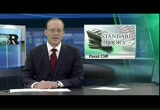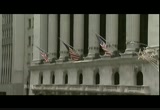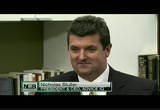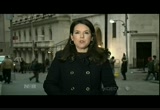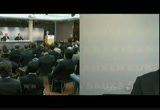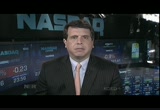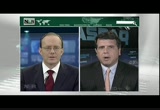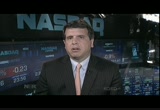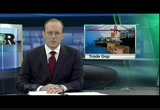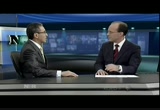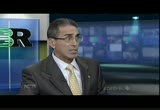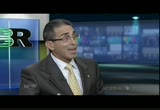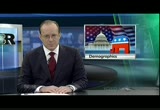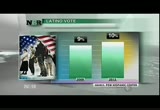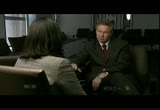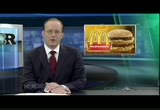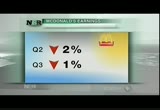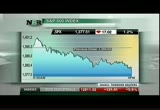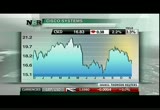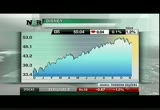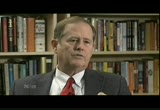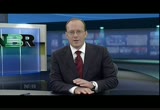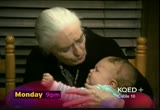tv Nightly Business Report PBS November 8, 2012 6:30pm-7:00pm PST
6:30 pm
>> this is nbr.r. captioning sponsored by wpbt >> tom: good evening. i'm tom hudson. susie is on assignment tonight. a repeated warning to washington-- if the u.s. goes over the fiscal cliff, it would push the economy into a recession. and late today, a top credit rating agency puts the odds of going off the cliff at 15%. plus, how g.o.p. economic policies could change as election day demographics change. that and more tonight on nbr! the u.s. economy would be driven into recession next year if the fiscal cliff is not solved in time. that's the warning again today from the congressional budget office. and the standard and poor's ratings agency said there's an increasing chance we will go
6:31 pm
over that cliff of tax increases and spending cuts. it puts the odds at 15%. still, s&p is optimistic about a solution, saying "the most likely scenario, in our view, is that policymakers reach sufficient political compromise in time to avoid most, if not all, potential economic effects of the cliff." both s&p and the congressional budget office warned unemployment would go over 9% by the end of next year if the cliff is triggered. those s&p comments hit the market in the last 30 minutes of trading, extending yesterday's sharp losses. the dow closed down 121 points, the nasdaq lost 41, and the s&p was off 17. the headlines of big sell-offs in the major stock averages only further erode confidence for already nervous investors. suzanne pratt tonight takes a look at whether small investors feel differently about buying stocks now that the election is over.
6:32 pm
>> reporter: now that the election is over, there are fewer clouds hanging over the stock market. wall street knows who will be living in the white house for the next four years, and that congress will remain divided. what's unknown is whether retail investors will continue to be a stock market no-show, as they have been since the financial crisis. the answer to that is a bit of mixed bag. >> after any presidential election, the next year is a lousy year for stocks. it has nothing to do with who is elected; it's just that every president tries to get the bad stuff out of the way the first year. >> if i wanted to invest, i don't think i would have any worry about that. i definitely would be okay with it right now. >> it doesn't matter who wins the election. even if a republican wins the office, investors will be cautious anyway. >> reporter: advice iq collects data from thousands of financial advisors, and its c.e.o. says investors still want to wait before buying stocks. >> the advisors are trying to
6:33 pm
convince the investors, as they should, don't wait, because there's an old saying on wall street-- "the best time to buy stocks is 30 years ago; the second best time is today." >> reporter: stuller says investors are nervous because they're scared about america's fiscal cliff, as well as europe's financial crisis. but market pros say, seasonally, this is a great time to wade back in. >> november, december, january is the best three-month period in the stock market. these are your best gains, historically. so if we don't see investors' demand coming in soon, when's it going to happen? >> reporter: others say it's going to happen when investors get the message about the importance of equities in their portfolio. >> to get them back into the market over the next 12 to 24 months, we think lots of education, but from different kinds of people-- you're advisor, if you have one. if you don't have an advisor, it would be good to hear that
6:34 pm
message from your employer. >> reporter: financial planners believe once the fiscal cliff problem is solved, we'll probably get a relief rally in the stock market. they predict that run-up will be a magnet for reluctant retail investors. suzanne pratt, nbr, new york. >> tom: to learn more about investors and presidential elections, head to nbr.com. there you'll find more on historical changes in the dow at the end of presidential terms. just look for the "nbr-u" tab. in europe today, two key central banks left their interest rates unchanged, despite few signs the economy is picking up. the bank of england and the european central bank took no action to provide any additional help for their economies right now. both have undertaken bond buying strategies, hoping to stimulate growth by keeping down market interest rates. the lack of action comes after protests in greece as greek lawmakers agreed late yesterday to a new round of budget cuts. president of the european central bank thinks the european debt problems have improved, but
6:35 pm
are not over. >> compare the situation today with what it was even less than a year ago and the conclusion is unavoidable-- there has been substantial progress. is the task finished? not at all, not at all. >> tom: nick colas is the chief market strategist at converg-ex. he joins us from the nasdaq. so nick, we began the show with another dire warning about the fiscal cliff and the threat of recession. now we just heard that substantial progress has been made with the european debt situation. are europe's troubles deeper than the u.s. here as we sit in the latter half of 2012? >> well, i would say that europe's problems are deep never many ways. unemployment in places like greece is reaching north of 25%, north of 58% for young people, so there are pockets of europe that are clearly much worse than the general u.s. economy. but i would say that the u.s. is quickly catching up.
6:36 pm
the issues of the fiscal cliff are serious and fairly immediate. >> tom: are they making substantial progress in your estimation toward avoiding that cliff like we just heard from the european central bank, the president in his explanation of what they think they have done if the last year? >> i think europe has certainly made some real progress. particularly in the last few months in putting a firewall in place that doesn't allow the problems it in spain, spanish debt, for example to infect other markets such as france or even germany. but at the same time you've got to look at the general economic picture there which is still quite soft and just yet the president was talking about the effects of the euro joan crisis has had. while they are certainly better off then they were they are not on the right path to better growth. >> so here in the u.s. post-election day two days of significant selling pressure with the drumbeat of the cliff getting louder but you mentioned cracks exposed in europe. what do you think is really driving the selling that we are seeing here in the u.s.?
6:37 pm
>> it is a great question. i think you can chalk up yesterday's response to the election. a bit of a surprise though it really shouldn't have been. what we are seeing now is the beginning of the real says that the negotiation around the fis wall-- fiscal cliff is not going to be simple or immediate t will take time, probably go to the 23rd hour at the end of this year and will only be a stopgap measure to take us into 2013. and will have to negotiate large chunks of the cliff with the new congress in 2013. so it will be a problem that stays with us for some months it won't be answered in the next week or two. what about today's sell-off and dow accept this kind of pressure to continue with the drumbeat of the fiscal cliff and the european situation continuing. >> well, it's important to keep a really balanced perspective here. certainly the fiscal cliff is an issue, as are many other macro concerns, unemployment, low consumer confidence coming into the holidays, there is a lot to be worried about. but remember u.s. companies have done a fantastic job improving their earnings
6:38 pm
profile and the s&p will earn somewhere on the order of 80 to 90 dollars a share next year. while that leaves the market fairly fully valued it is not overvalued so i wouldn't anticipate a big pullback but macro concerns are an issue. >> they certainly will be in the forefront for a lot of invests-- investors big and small. at the nasdaq nick colas is a long with us from convergex. >> tom: still ahead, a sour economy takes a bite out of mcdonald's sales. we look at the fast food giant's first monthly sales drop in almost a decade. a surprise in the september trade numbers-- the trade deficit narrowed, thanks to a surprise rise in exports. the trade gap shrank 5% in september to $41.5 billion. analysts expected it to hit $45 billion. exports rose by over $5 billion from august levels to $187 billion. while that's good news for the
6:39 pm
u.s. economy, economists worry that, as the global economy slows down, u.s. exports may follow suit. hurricane sandy showed up in the latest report on jobless claims, making them artificially low. initial claims for unemployment benefits dropped by 8,000 to a seasonally adjusted 355,000 at the end of last week. the number is expected to be revised higher as more data is collected. the labor department says one state filed fewer claims because of power outages, while the storm boosted claims in other states where more people looking for relief. later in the program, we'll look at sandy's impact on retailers.
6:40 pm
>> tom: the biggest bank in america has the okay now from uncle sam to pay back shareholders. jpmorgan will be allowed to restart a stock buyback plan early next year. like all systemically important banks jpmorgan has to get regulatory approval to change its dividend or stock-repurchase plan. the regulators want banks to have enough financial firepower to withstand troubled times before the banks will spend money on share holders. jpmorgan's buyback strategy was suspended this year after it lost $6 billion when a derivative trading strategy back fired. the bank will resume buying back stock in the first quarter. it has 1.4 billion dollars of its $3 billion goal still left. now the bank also said it has an agreement in principles to settle an investigation into how mortgage securities were sold to investors but its bear stearns unit. kenneth thomas is with us an independent banking analyst here at nbr. ken, first of all, jpmorgan has just over 10% of its firepower. that is that buffer, the
6:41 pm
capital buffer that regulators look for. is that enough? >> yes, it certainly is. in the case of jpmorgan they are the bank right now. and jamie diamond is the bank. the go to go. >> tom: capitol requirements is what that is referred to, at 10% buffer that is just one area of regulation that regulators are focused on since the mortgage in the housing bust, and the banking collapse. with president obama being re-elected and status quo in terms of the balance of power on capitol hill, what can we expect in terms of banking regulations going forward? >> clearly more regulations. banks are going to have to be stronger. they're going to have to come up with these plans, what happens if they get into trouble. but much more regulation across-the-board. >> tom: what does it mean for shareholders? >> shareholders are being to have some issues with financial stocks. clearly because these additional kline's costs are going to mean greater costs overall to the banks and not as much profit. so the stronger banks will
6:42 pm
get in the different areas but so many of the weaker banks will have to be merged out. >> tom: another big voice for banking regulations will now be in the united states senate, this is elizabeth warren. she was elected as a democrat from massachusetts for the u.s. senate on election day. she has got quite the resume as chair of the tarp oversight committee and a special advertiser, was a special advertiser to the consumer financial protection board. what does she bring to bear when it comes to financial regulation? >> well, decide os bama she was the number two target on the banks list. they did not want either of them. with both of them back, with clearly with warren there especially if they get os on the senate banking panel this will many much heavier regulation and she will be there to protect new consumer bureau that the banks have attacked so much. >> tom: from a consumer standpoint, though, because we have seen banks try to raise some consumer fee, trying to raise banking fees as they try to make up for the lost profit that they are see on the regulatory side. will it mean a safer banking industry?
6:43 pm
>> absolutely. safer, more responsive, and protection this is what it is about. protecting the consumer. we've already seen their actions. the banks are very concerned about it they have done everything to weaken it. but she will be there to make sure it stays there and she will have it back. >> what types of banks particularly do you see being able to operate in this environment? >> really large banks. because with all the costs of kline's, you have to get to a certain economy of scale. we have 7,000 banks, many of these banks would not be around in two or three years. >> tom: because of failure or because they will be bought out? >> well, because of not being able to have the economies of scale to manage these compliance cost. you just have to have too many people. and only a bank of a certain size, shape, 500 million, at least a billion dollars. and so many of our banks are under that size, economies of scale. >> tom: that say big sized bank there we've got with independent bank list tonight, kenneth thomas. >> tom: republicans are still reeling from tuesday's loss in the presidential election.
6:44 pm
it was the fifth out the past six presidential elections where the republican party has lost the popular vote. republicans may have kept control of the house this time around, but they lost seats in the senate. many strategists say the results suggest it's time for the party to rethink how it sells its economic message. sylvia hall reports. >> reporter: tuesday was a tough night to be a republican. the party had campaigned on the promise of a better economy, the top issue for most voters, but still lost. the results suggest the grand old party isn't keeping up with a country whose make-up is changing fast. >> the economy should have put the republicans in control. the irony in this election is that the groups that were hit the hardest in this economy with the highest unemployment rate voted overwhelmingly for the incumbent president. >> reporter: the majority of women, young people, african americans, asians and latinos favored president obama at the ballot box. the latino vote is particularly important, this year making up
6:45 pm
about 10% of the electorate, up from 9% in 2008. and it's expected to grow from here. >> by 2050, 29% of the nation's population is expected to be hispanic. today, that number is about 17%. >> reporter: unemployment among hispanics is still very high at 10%, but that's down from 12.7% at the end of the great recession. the poverty rate for hispanics is also high, but dropped last year. >> when you just ask hispanics about their own views of their own personal finances, over the last year, there's been an improvement, and they expect the next year to be better. in fact, latinos, more so than the general public, expect their finances to improve in the coming year. >> reporter: that means that to sway these voters, and voters in other key groups, the republican party needs to do a better job of relating its economic message during future campaigns. >> the challenge to republicans, and given their potential opportunity here, is "how do you articulate your... the economic policies of the republican party in such a way that people believe it will lead to economic growth, and then that economic growth will lead to a better situation for them and their family?" >> reporter: former republican
6:46 pm
congressman tom davis says the party has to tone down other issues, like the party's hard line on immigration, to attract a more diverse group of voters. >> this isn't a reason to panic for republicans, but it is a cause for concern. and they need to understand the demographics are going to continue to change, and we know what direction they're going to change in. and if we don't start making the appropriate moves at this point, it's going to come back and be an insurmountable problem for us. >> reporter: sylvia hall, nbr, washington. >> tom: the big mac is feeling some heat from the whopper and the chalupa. last month, sales at mcdonald's
6:47 pm
open more than a year fell nearly 2%, its first monthly drop in nine years. the company's stock fell $1.73, or 2% today, to $85.13, its lowest close in more than a year. one reason for the slower sales is tougher competition. diane eastabrook has details. >> reporter: mcdonald's is used to serving up strong profits along with its burgers and fries. but disappointing sales in october are yet another sign that all is not well with the fast food chain. in october, global sales for stores opened at least a year were down 1.8%. in the same month last year, they were up 5.5%. analysts say mcdonald's is facing much tougher competition from other fast foods chains, and is also a victim of its own past success. >> one of the things to keep in mind too is mcdonald's has had great same-store sales the last three years, and with a three year track record like that, it's inevitable there is going to be comparisons, especially when we're dealing with negative same-store sales.
6:48 pm
>> reporter: mcdonald's has been struggling for most of this year. it reported lower earnings in the last two quarters compared to the same periods in the previous year. not only is mcdonald's struggling with tougher competition from other fast food chains, the company also faces a stronger dollar, which lessens the value of overseas sales and rising commodity costs. today, mcdonald's president and c.e.o. don thompson acknowledged a tougher global market place and in a statement said: "i am confident that our strategies and the adjustments we are making in response to the current business headwinds will build sales momentum and drive sustained, profitable growth." some of the adjustments the company is making include upgrades to existing restaurants, and showcasing breakfast items and specialty beverages. diane eastabrook, nbr, chicago. >> tom: u.s. stock indices continue sinking to fresh three month lows.
6:49 pm
after starting the day with a small rally, the s&p 500 turned lower mid-morning and sank into the closing bell, finishing at its lowest level of the day, down 1.2%. with today's drop, the losses over the past five sessions amount to 3.7%, with the index at its lowest level since early august. trading volume was 757 million shares on the big board; just under 1.9 billion on the nasdaq. the energy sector led the sell- off, down 1.7%. consumer stocks were weak, falling 1.6%. and the tech sector was down another 1.4%. technology has been particular weak in this recent market sell- off. new product launches from apple and microsoft have not been enough to erase worries about consumer and company spending on technology. the sector exchange traded tells the story-- it fell 1.4% today at a three and a half month low. internet networking gear maker cisco systems was among those
6:50 pm
leading the way lower. it fell 2.2%. cisco is due to report earnings next week, giving investors a peak into its turnaround effort and corporate tech spending. the holiday sales may be starting earlier than ever this year, but some retailers, they've seen investor sales hit their stock prices. kohl's and coach target different types of shoppers, but both suffered stock drops. coach fell 5.3%. coach's business has been helped by its stores in china. a new set of communist leaders are expected to be announced in china in the coming days. meantime, kohl's fell 5.1%, despite better than expected quarterly results. it's holiday forecast was a little shy of expectations. consumer giant disney can credit its media business for helping grow its bottom line in the latest quarter. earnings matched estimates at 68 cents per share. it has turned in quarterly double-digit earnings growth for more than a year, thanks to its
6:51 pm
cable tv business like espn and its theme park operations. the stock dropped only a fraction before tonight's earnings report. after the close, they fell 1% with analysts pointing to disney's less than anticipated revenue. just last week, disney announced it was buying the "star wars" franchise for just over $4 billion. name-your-own-price travel web site priceline has its price for kayak software-- $1.8 billion. the buyout comes just months after kayak went public. before the announcement, both stocks were down in the regular session. but kayak shot up to more than $39 per share, just a dollar below the buyout price. priceline, the buyer, fell to $614 after closing at $628 per share. all five most active traded exchange traded products were lower again today. this time, the nasdaq 100 tracking fund fell the most, down 1.6%. and that's tonight's "market focus."
6:52 pm
>> tom: just as you probably guessed would happen, retailers are starting holiday specials earlier and earlier. walmart is joining a host of retailers opening its doors at 8:00 p.m. thanksgiving night. the giant retailer says it's opening earlier because shoppers are asking for it. that's only two weeks from today. with the holiday season rapidly approaching, there's growing concern about sales. hurricane sandy cut into shopping in the mid-atlantic and northeast region by about $4 billion last week, according to mastercard spending-pulse. that region accounts for about a quarter of all retail sales nationwide. but at least one analyst predicts sandy's hit will be temporary. erika miller reports.
6:53 pm
>> reporter: first, we had superstorm sandy. last night, a snow storm. but today, new yorkers were back to shopping in full force. contrary to conventional wisdom, natural disasters have very little long-term impact on retail spending. >> they don't destroy demand, they displace it, either forward in time-- before the event-- or after the event. or nowadays, of course, from bricks and mortar to online. >> reporter: customer growth partners looked at 20 years of natural disasters and found that in virtually every case, spending rose in the months after the event. sandy or not, the holiday season is expected to be ho-hum for retailers. the national retail federation, the retail industry's trade group, is forecasting a more than 4% gain, but customer growth partners, which does field research with shoppers, expects just a 2.8% gain. >> disposable income is weak, and disposable income is still the single biggest driver behind
6:54 pm
retail sales. so that's weak. there's fears of unemployment. the employment situation is a little bit better, but it's a long way from being solid with 23 million people still unemployed or underemployed. >> reporter: the good news is that the presidential election is over, so retailers are hoping americans will be more inclined to spend. but there's one big wildcard that may affect spending this year, the fiscal cliff. >> we have a month and a half for congress to work this through. and if they can make some kind of compromise, so at least you know what your incremental taxes will be next year, and it's not as bad as you might imagine, you will spend this year. >> reporter: sandy may not hurt holiday sales, but the storm has clearly had a short term regional impact. along the east coast, customers have been buying more needs and less wants, although that's expected to change as the holiday season approaches. erika miller, nbr, new york.
6:55 pm
>> tom: tomorrow on nbr, our friday "market monitor" guest says the economic recovery will keep moving forward and take stocks higher. he's russell investments' erik ristuben. and we'll check in on how people are feeling about the economy with the latest consumer confidence number. finally tonight, a run on bed socks, as cash-strapped britons try to keep old man winter at bay as gas and heating costs soar. bed socks are just what you think they are-- socks designed to be worn in bed. sock maker h.j. hall normally sells about 3,000 pairs between october and february. already this year, 9,000 pairs have flown off store shelves. 86% of its buyers said they were buying to delay turning on the heat. that's "nightly business report" for thursday, november 8. good night, everyone. we'll see you online at nbr.com, and back here tomorrow night. captioning sponsored by wpbt
6:56 pm
149 Views
Uploaded by TV Archive on

 Live Music Archive
Live Music Archive Librivox Free Audio
Librivox Free Audio Metropolitan Museum
Metropolitan Museum Cleveland Museum of Art
Cleveland Museum of Art Internet Arcade
Internet Arcade Console Living Room
Console Living Room Books to Borrow
Books to Borrow Open Library
Open Library TV News
TV News Understanding 9/11
Understanding 9/11
